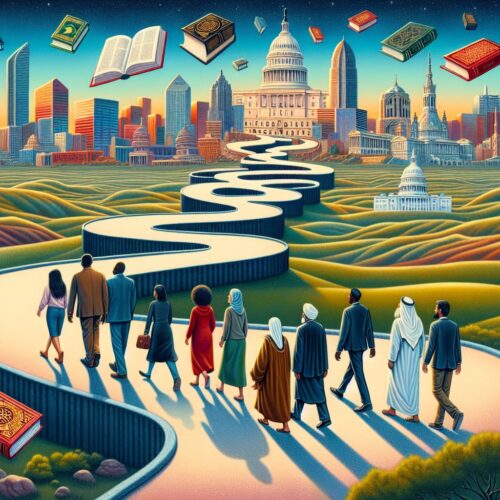In a world profoundly shaped by religious beliefs and political systems, the intertwining of monotheism and politics has fostered a complex web of moral and ethical dilemmas. While monotheistic religions encompass a multitude of beliefs, this article focuses on the larger Abrahamic traditions, namely Judaism, Christianity, and Islam. As these religions continue to exert their influence upon societies, the moral dimensions of their faith find their way into political decision-making processes and governance. Exploring this intricate relationship provides an opportunity for deep reflection on the dynamic nature of power, morality, and human agency.
- The Divinely Mandated State
Monotheistic traditions often see the divine as the ultimate source of authority. This concept is ingrained in religious texts that prescribe rules and laws for humanity to follow. These texts proclaim the establishment of a divinely mandated state, where the political structure aligns with religious tenets. This alignment poses a moral challenge: how can a state grounded in religious principles accommodate those who hold differing beliefs or none at all? Striking a balance between divine prescription and pluralistic ideals is a pressing concern faced by contemporary monotheistic societies. - Sacred Law and Secular Governance
Monotheistic religions have sacred laws, such as Islamic Sharia, that prescribe moral and ethical guidelines for believers. These laws often clash with modern notions of human rights and equality. The challenge lies in incorporating these religious laws into democratic governance in a way that respects individual rights and ensures social harmony. Deciphering the intersections between secular principles and divine commandments requires ongoing dialogue, adaptability, and negotiation. - Religious Authorities and Political Influence
Religious leaders hold significant sway over their followers, making their involvement in political affairs unavoidable. However, their participation raises questions about the blurring of church and state, the influence of dogma on public policy, and the potential for favoritism towards certain religious groups. Striving for a delicate equilibrium between religious autonomy and government accountability is vital in maintaining a just society. - Monotheism, Nationalism, and Identity Politics
Monotheistic beliefs sometimes become entangled with nationalism, resulting in identity politics and exclusivist tendencies. The intertwining of religious and political identities can lead to the marginalization of minority groups and heighten social tensions. Fostering inclusive societies that uphold the principles of religious freedom and equality becomes imperative in breaking this cycle of division.
Conclusion
The intricate relationship between monotheism and politics unveils a myriad of challenges that societies must confront. Navigating this intersection requires acknowledging the potential pitfalls of religious authoritarianism and the exclusionary tendencies that can accompany it. By fostering an ongoing dialogue between religious and secular perspectives, societies can strive towards moral governance that respects individual liberties, upholds human rights, and promotes social cohesion. Recognizing the complexity of this relationship establishes a solid foundation for informed discussions, encouraging individuals to critically examine moral dimensions in politics and engage in further introspection.
In conclusion, the integration of monotheistic beliefs and political systems presents a multifaceted landscape of ethical considerations. By fostering open dialogue, embracing diversity, and emphasizing individual rights, societies can navigate the intertwining realms of monotheism and politics with greater awareness and enlightenment.
